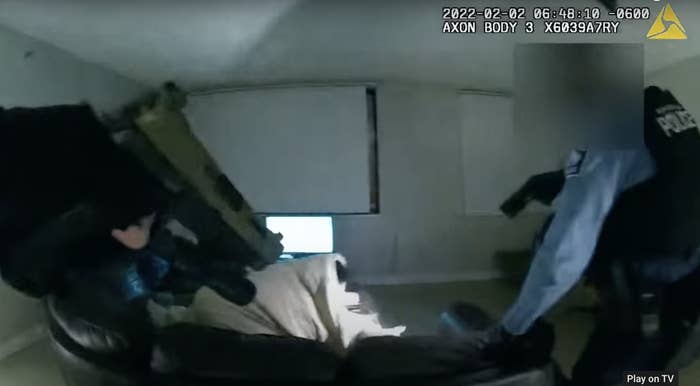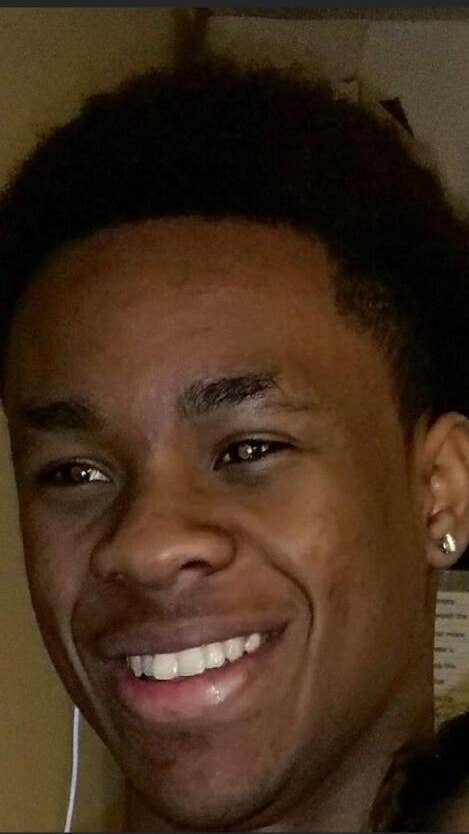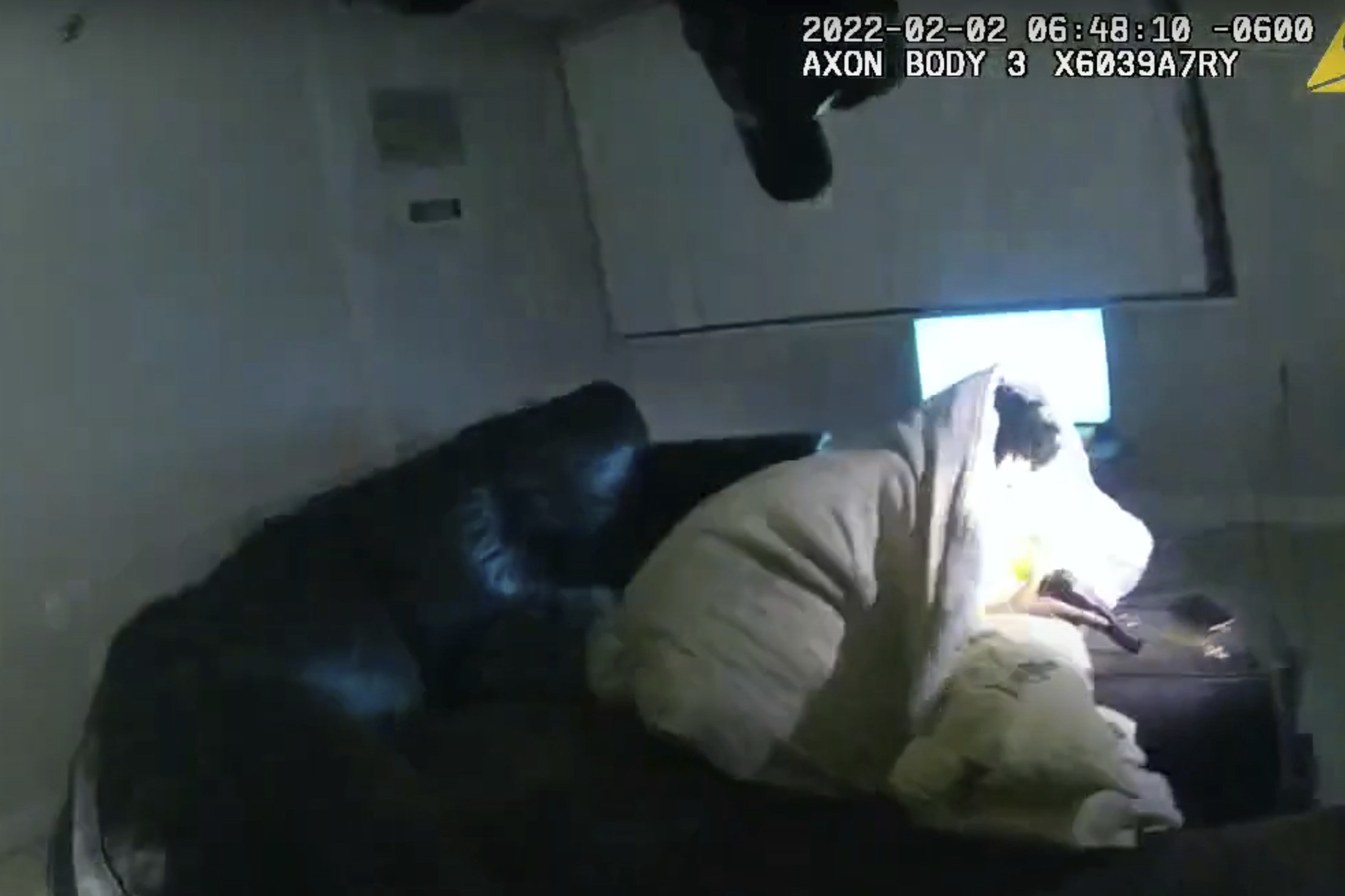
Minneapolis police killed a Black man while executing a "no-knock" search warrant early Wednesday morning, firing at the 22-year-old eight seconds after SWAT officers stormed through the front door of an apartment, video released by the department showed.
"Police! Search warrant!" the officers can be heard yelling as they enter the apartment, where Amir Locke was lying on a couch. "Get on the ground! Get on the fucking ground!"
The short video from a body-worn camera shows that Locke was holding a handgun, but police said he was not named in the search warrant, and it is unclear how, or if, he was connected at all to the homicide investigation that prompted SWAT officers to conduct predawn searches in three Minneapolis apartments in the same building.
Now, the city of Minneapolis, where the killing of George Floyd sparked a protest movement against police violence across the country, is once again facing criticism and scrutiny on how the police department and city officials have responded to the deadly shooting.
Locke's death has also raised questions about the officers' decision to search through the apartment using what is commonly referred to as a "no-knock" warrant, a controversial practice in which police do not announce their presence or the execution of a search warrant until after they've gained entry.
Some jurisdictions have banned or limited the use of similar warrants following the killing of Breonna Taylor in Louisville, Kentucky. The 26-year-old was killed by police executing a similar warrant.

"My son was executed," Locke's mother, Karen Wells, said at a press conference Thursday.
On Thursday evening, Minneapolis police released a short clip of the deadly shooting from an officer's body-worn camera.
During a press conference on Friday morning, Mayor Jacob Frey and Interim Police Chief Amelia Huffman said the decision to release the video was done in an effort to maintain transparency and accountability as an investigation into the shooting is underway.
"Anyone who watches these videos, no matter the circumstances, at the very least experiences a deep and unsettling feeling," Frey said. "It's gut-wrenching. No matter the circumstances, a man, Amir Locke, has lost his life."
But activists and Locke's relatives have slammed the city's handling of the deadly shooting and their decision to release only a portion of the body camera video. They also questioned the police department's decision to refer to Locke in their initial press release as a "suspect" despite the fact he was not named in the search warrant. It was unclear if he was at all connected to the initial investigation.
Huffman acknowledged that her department did not have adequate information while putting out the press release, adding that it "remains unclear" how Locke was connected to the homicide investigation by the St. Paul Police Department.
Hours after a contentious press conference Friday morning, Frey announced he would be imposing a moratorium on "no-knock" warrants following the deadly shooting, meaning police officers in the city would not be allowed to request the warrants while a new policy on the controversial tactic is composed by the city.
"To ensure safety of both the public and officers until a new policy is crafted, I'm issuing a moratorium on both the request and execution of such warrants in Minneapolis," Frey said in a statement.
MPD officers would only be allowed to execute warrants where they announce their presence and give a "reasonable amount of time" before making entry.
The city had announced changes to their "no-knock warrant" practices back in Nov. 2020, where officers would be required to announce their presence as they enter a location.
Frey announced that civil rights activist DeRay McKesson and Pete Kraska of Eastern Kentucky University — who helped frame Breonna's Law in Louisville, which banned the practice — will spearhead the effort to craft a new policy.

Video released by the department shows officers opening the door to the apartment with a key and yelling "Police! Search warrant!" At least five officers can be seen going in, firearms drawn.
A figure underneath a blanket is seen moving, and a head and a hand holding a firearm can be seen just a split second before shots are heard.
An incident report of the shooting stated that Locke was shot twice in the chest and once in the wrist. Officials have identified the officer who fired as Mark Hanneman.
At Friday's press conference, Huffman said two types of warrants were obtained to search the three apartments: a "no-knock" and a "knock" warrant so that SWAT officers could decide on the ground how they would make entry into the homes.
KARE 11 and the Star Tribune reported Friday that it was the Minneapolis Police Department who had insisted on using a "no-knock" warrant.
"An investigation is underway so we don’t have all the facts yet, but a 22-year-old life ending in gunfire is a tragedy," Minnesota Gov. Tim Walz said in a statement Friday. "Minnesota made strides last year, passing statewide restrictions on the use of no-knock warrants. But the events leading to the death of Amir Locke illustrate the need for further reform."
Locke's family said that he owned the gun he was seen holding on the video and had a permit to carry it, even though a permit would not have been necessary inside a home.
Huffman said that when the officer saw the weapon, he "had to make a split-second decision."
"Ultimately, that decision on whether that threshold was met will be examined by the county attorney's office that reviews this case," she said.
But activists confronted Huffman and Frey about why they released images of his handgun and why the initial statement from police had stated that Locke had pointed a gun in an officer's direction even though that allegation was not repeated by authorities once the bodycam video was released.
Huffman said the officer who claimed the gun was pointed in their direction was "offscreen" and that the investigation would determine whether the statement was accurate.
Nekima Levy Armstrong, a civil rights attorney who cochairs a city group to address public safety and police accountability, walked up to the mayor and interim police chief during the press conference, calling their handling of the investigation "the anatomy of a cover-up."
Pushed on why Locke had been called a "suspect," Frey and Huffman abruptly ended the press conference.
"This is what we've been fighting against since George Floyd — running away from transparency and accountability," said Jaylani Hussein, executive director of the Minneasota chapter of the Council on American–Islamic Relations, taking the podium after the mayor and interim chief walked away. "This was Breonna Taylor in Minneapolis."
Members of the city council echoed the criticisms.
"The Mayor failed to make changes after the murder of George Floyd and MPD continues to have unchecked power to judge and execute Black people," Robin Wonsley Worlobah, a city council member, tweeted.
The Mayor failed to make changes after the murder of George Floyd and MPD continues to have unchecked power to judge and execute Black people. Mayor Frey asked voters for more power, and he got it. He needs to use his power to create a Department of Public Safety, or resign.
"I'm sick," Jamal Osman, another city council member, wrote on Twitter. "They shot him in his sleep. I don't know where to start or end. Failing another young black man in Minneapolis. I call for the justice system to move as quickly and as surely as possible to hold the officer involved accountable."
I’m sick. The video is horrifying. They shot him in his sleep. I don’t know where to start or end. Failing another young black man in Minneapolis. I call for the justice system to move as quickly and as surely as possible to hold the officer involved accountable.
Minnesota Attorney General Keith Ellison's office stated that it was partnering with the Hennepin County attorney's office to investigate the shooting.
"Amir Locke's life mattered," Ellison said in a statement. "He was only 22 years old and had his whole life ahead of him. His friends and family must now live the rest of their lives without him."
